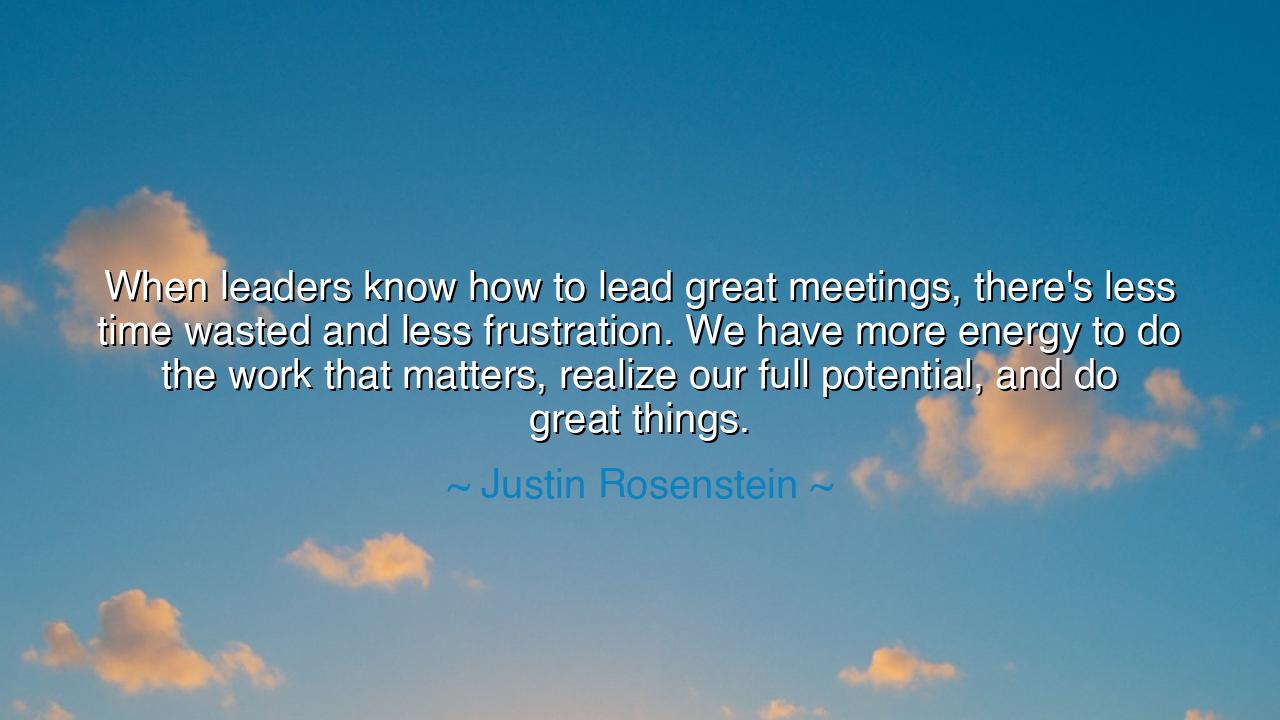
When leaders know how to lead great meetings, there's less time
When leaders know how to lead great meetings, there's less time wasted and less frustration. We have more energy to do the work that matters, realize our full potential, and do great things.






In the words of Justin Rosenstein, “When leaders know how to lead great meetings, there's less time wasted and less frustration. We have more energy to do the work that matters, realize our full potential, and do great things.” These words, though spoken in the language of modern enterprise, carry the eternal wisdom of all ages — that leadership, when guided by clarity, purpose, and harmony, transforms chaos into creation. The meeting, in Rosenstein’s vision, is not a mere gathering of minds, but a sacred council of intent, where vision becomes action and action becomes progress.
Justin Rosenstein, co-founder of Asana and a creator of tools designed to help teams collaborate with precision, spoke from a place of deep understanding. He had seen firsthand the quiet tragedy of wasted effort — the hours lost in disorganized discussion, the fire of creativity dimmed by confusion. In his words lies a simple but profound truth: that the quality of leadership determines not just the fate of an organization, but the energy of its people. When leaders conduct meetings with wisdom, they become like conductors of an orchestra, drawing forth harmony from many voices and ensuring that every moment serves the greater symphony of purpose.
In the ancient world, meetings were not called to fill time, but to shape destiny. Consider the council of Alexander the Great, who gathered his generals before setting forth to conquer the known world. Each voice had its place; each idea, its moment. Through discipline and unity, they forged not just battles, but empires. When a leader knows how to convene and guide such assemblies, time itself becomes an ally rather than an enemy. The same principle that guided the generals of Alexander applies today: the mastery of communication and coordination is the foundation upon which all greatness is built.
Yet Rosenstein’s words carry not the cold tone of command, but the warmth of empowerment. A great leader, he reminds us, does not speak to dominate, but to elevate. When meetings are run with purpose, the people within them feel seen, heard, and valued. The energy once drained by confusion returns as creativity; the frustration once bred by aimlessness becomes focus. From such gatherings flow innovations that shape nations and discoveries that alter history. As the ancients gathered around the fire to plan the harvest or the voyage, so too must the modern team gather — not to speak endlessly, but to align their spirits toward a shared goal.
But the quote also carries a subtle warning: that time, once lost, cannot be reclaimed. Every moment wasted in poor leadership is a flame extinguished in the hearts of the people. In this sense, a meeting without direction is like a ship without a compass — it moves, but nowhere meaningful. The true leader understands that their first duty is not to speak, but to clarify — to set intention, to create rhythm, to ensure that every word spoken brings the team closer to realization. Just as the philosopher Marcus Aurelius reminded his generals that no motion should be without purpose, so too must every gathering of minds serve the higher work.
The lesson here is timeless: leadership is not about control, but about channeling collective energy. The wise leader prepares before the meeting begins, defining its aim and honoring the time of all who attend. They listen more than they speak; they seek solutions rather than applause. Such leaders create an atmosphere where the smallest voice may spark the greatest idea, where clarity replaces confusion, and where purpose breathes life into every task. This is the alchemy of great meetings — they transform time into momentum, and momentum into achievement.
So, children of the modern age, remember this teaching: treat every gathering as sacred. Speak with intention. Listen with patience. End what has no purpose, and nourish what moves the world forward. For when leaders learn the art of meaningful collaboration, they awaken the hidden power of humanity — the ability to create not through isolation, but through unity. And in that unity lies the seed of greatness, from which all great things are born.
Thus spoke Justin Rosenstein, not as a mere builder of tools, but as a steward of the ancient principle that has guided humanity since the dawn of civilization: that where people gather with purpose, and where leaders lead with wisdom, there — and only there — the impossible becomes possible.






AAdministratorAdministrator
Welcome, honored guests. Please leave a comment, we will respond soon